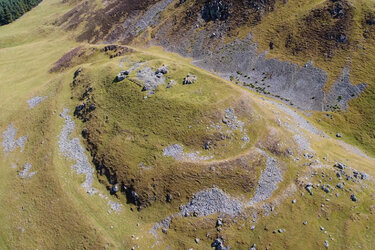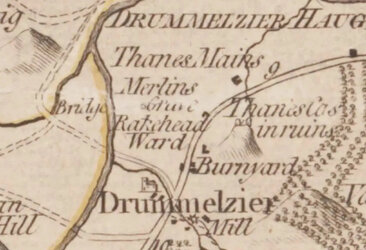Article / Archive
By Hannah Sparks
Published Sep. 8, 2024, 3:43 p.m. ET
There may be some truth to the myth of Merlin.
On Tuesday, archeologists in Scotland revealed evidence of the legendary wizard’s death in Drumelzier between the 6th and 7th centuries — and the findings could change the way we tell Merlin’s tale.
Merlin was said to have been a loyal advisor to King Arthur amid the Dark Ages before being imprisoned, killed and buried along the river Tweed, according to Vita Merlini Sylvestris (the Life of Merlin of the Forest), a medieval manuscript of his life which is currently held at the British Library.

According to Vita Merlini Sylvestris, a medieval manuscript dedicated to the life of Merlin, the wizard was said to have been imprisoned, killed and buried on the banks of river Tweed in Drumelzier.
A new geological survey of the region, near the site of Tinnis Castle, detected a grave-like pit.
Further excavation showed signs of inhabitation during the alleged period of Merlin’s life.
“The Drumelzier legend contains pre-Christian customs, ancient Cumbric names and was associated with local sites where archaeology now shows could credibly have given rise to the story,” lead researcher Ronan Toolis told the National.
According to Toolis, who serves as CEO of GUARD Archaeology in Glasgow, such a prominent grave structure in this region would have been “quite rare” for the period in which it was dated. “It seems to be a remarkable coincidence that the one hillfort associated with this local legend dates to exactly the same time as the story is set,” he noted.
The results of the study two years in the making were published last week in Archeology Reports Online.

Merlin’s Drumelzier legend “paints a much darker picture” of the great wizard’s life as a close adviser to King Arthur.
“The new archaeological evidence does not prove that the local story was true but instead demonstrates that the legend likely originated in Drumelzier itself, rather than being brought here by a wandering medieval storyteller who roped in various random sites in the vicinity,” Toolis explained. “Perhaps it originated as a folk memory, to be embellished over the centuries before it spread far and wide and changed out of almost all recognition.”
Their discovery helps “[to paint] a much darker picture” of the wise and revered Arthurian figure, said Toolist. “That of a rather pitiful fellow prone to uttering nonsensical riddles and bewildering prophecies, and kept prisoner by an obscure petty tyrant of a forgotten kingdom, before dying a gruesome death, the victim of royal intrigue.”
By Hannah Sparks
Published Sep. 8, 2024, 3:43 p.m. ET
There may be some truth to the myth of Merlin.
On Tuesday, archeologists in Scotland revealed evidence of the legendary wizard’s death in Drumelzier between the 6th and 7th centuries — and the findings could change the way we tell Merlin’s tale.
Merlin was said to have been a loyal advisor to King Arthur amid the Dark Ages before being imprisoned, killed and buried along the river Tweed, according to Vita Merlini Sylvestris (the Life of Merlin of the Forest), a medieval manuscript of his life which is currently held at the British Library.

According to Vita Merlini Sylvestris, a medieval manuscript dedicated to the life of Merlin, the wizard was said to have been imprisoned, killed and buried on the banks of river Tweed in Drumelzier.
A new geological survey of the region, near the site of Tinnis Castle, detected a grave-like pit.
Further excavation showed signs of inhabitation during the alleged period of Merlin’s life.
“The Drumelzier legend contains pre-Christian customs, ancient Cumbric names and was associated with local sites where archaeology now shows could credibly have given rise to the story,” lead researcher Ronan Toolis told the National.
According to Toolis, who serves as CEO of GUARD Archaeology in Glasgow, such a prominent grave structure in this region would have been “quite rare” for the period in which it was dated. “It seems to be a remarkable coincidence that the one hillfort associated with this local legend dates to exactly the same time as the story is set,” he noted.
The results of the study two years in the making were published last week in Archeology Reports Online.

Merlin’s Drumelzier legend “paints a much darker picture” of the great wizard’s life as a close adviser to King Arthur.
“The new archaeological evidence does not prove that the local story was true but instead demonstrates that the legend likely originated in Drumelzier itself, rather than being brought here by a wandering medieval storyteller who roped in various random sites in the vicinity,” Toolis explained. “Perhaps it originated as a folk memory, to be embellished over the centuries before it spread far and wide and changed out of almost all recognition.”
Their discovery helps “[to paint] a much darker picture” of the wise and revered Arthurian figure, said Toolist. “That of a rather pitiful fellow prone to uttering nonsensical riddles and bewildering prophecies, and kept prisoner by an obscure petty tyrant of a forgotten kingdom, before dying a gruesome death, the victim of royal intrigue.”